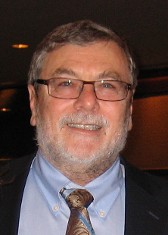Michael R. Pinsky, MD, Dr hc, MCCM

Michael R. Pinsky, MD, Dr hc, MCCM
Dr. Pinsky is a Professor of Critical Care Medicine with secondary appointments in , Bioengineering, Anesthesiology, Cardiovascular Diseases and Clinical & Translational Science at the University of Pittsburgh. He received his BSc and MD, CM from McGill University in 1971 and 1974, respectively, graduating as a University Scholar with First-Class Honours. He did an Internal Medicine residency and Pulmonary Medicine fellowship at Stanford University with additional training in cardiopulmonary physiology at Johns Hopkins Medical Institution. He joined the University of Pittsburgh faculty in 1981. He received Docteur honoris causa (Dr hc) from the Université de Paris V (Le Sorbonne) in 2002, and Master of Critical Care Medicine (MCCM) from the Society of Critical Care Medicine in 2012.
Dr. Pinsky is a medical attending at University of Pittsburgh Medical Center. He is the Vice Chair for Academic Affairs for the Department of Critical Care Medicine and Program Director of the Departmental of Critical Care Medicine’s NRSA (National Research Service Award) fellowship program which he founded and has run for the past 15 years. He is a member of the University of Pittsburgh’s Institutional Review Board for Biomedical Research, Ethics Committee and Physicians Diversity Inclusion Committee. He is a member of the ACGME Review Board for Pulmonary & CCM. He is the President of the University of Pittsburgh Senate now entering his third term.
Dr. Pinsky’s research interests are in the fields of heart-lung interactions, cardiovascular insufficiency, hemodynamic monitoring, sepsis, complexity modeling, mechanical ventilation and health services research and quality of life after critical illness. He has published more than 250 peer-reviewed papers, 220 chapters, and 25 volumes. He is the Director of the Cardiopulmonary Research Laboratory, Editor-in-Chief of eMedicine’s Critical Care Medicine and on numerous editorial boards and international program committees focusing on Critical Care Medicine issues and AHA Basic Science study section. He has been continually funded as PI or co-PI to perform biomedical research since 1980. His present funding comes from the NIH, DOD and industry to perform the translational research.

